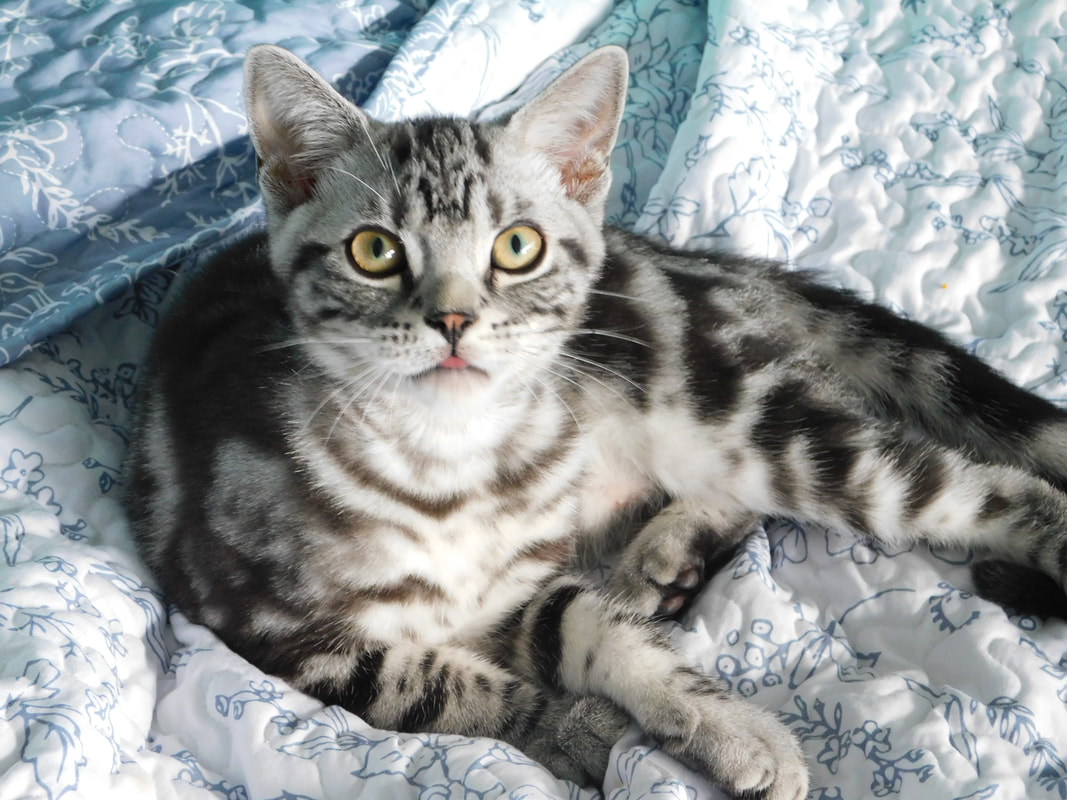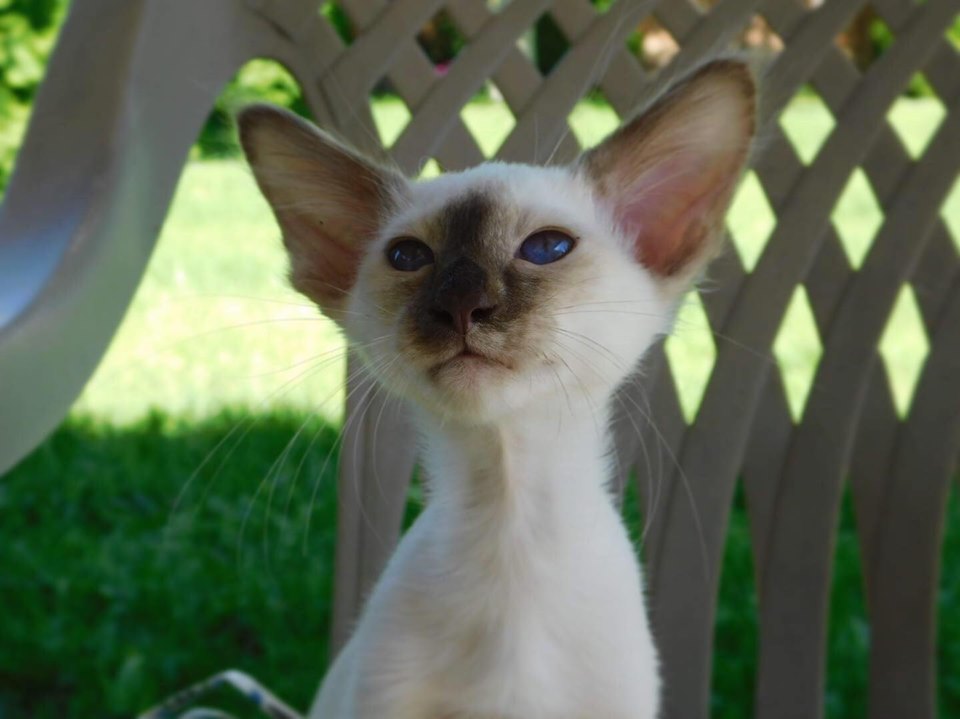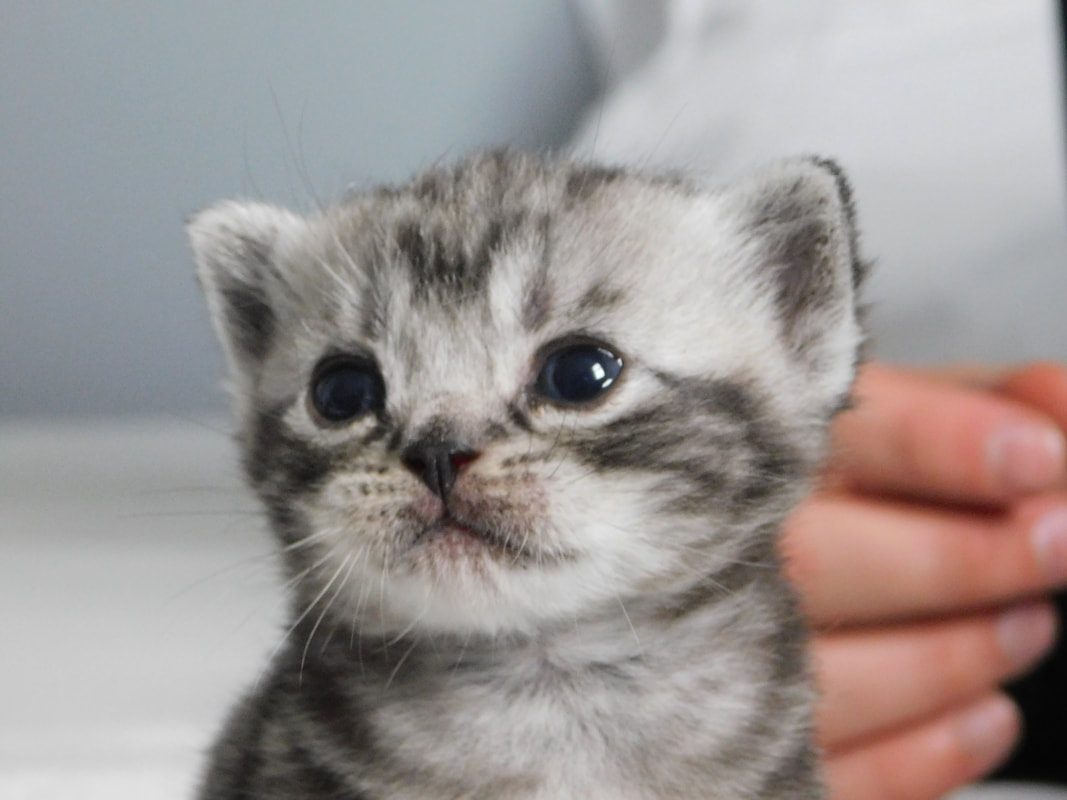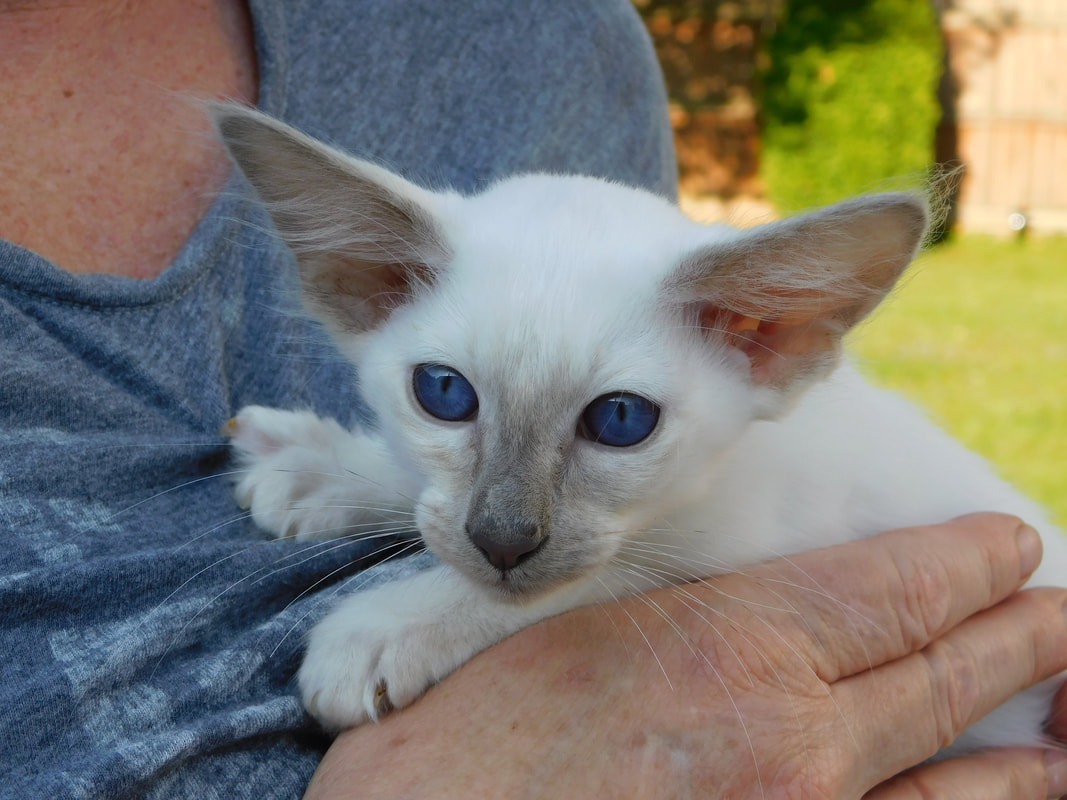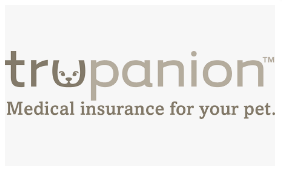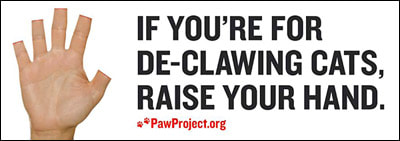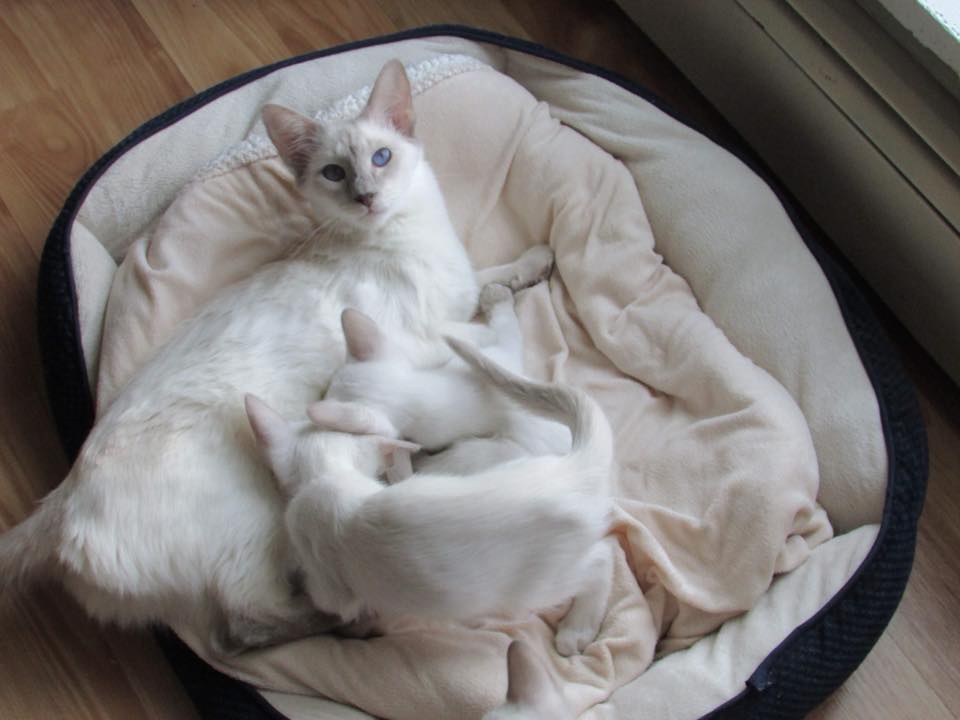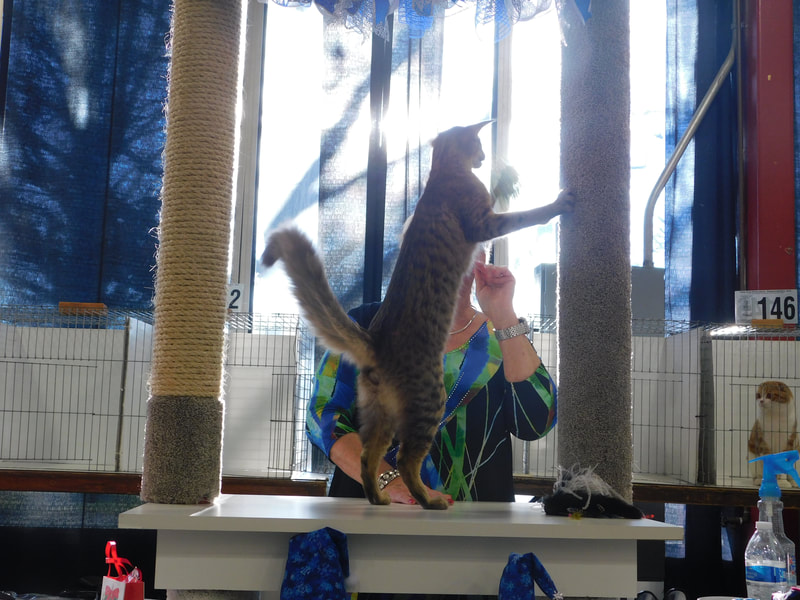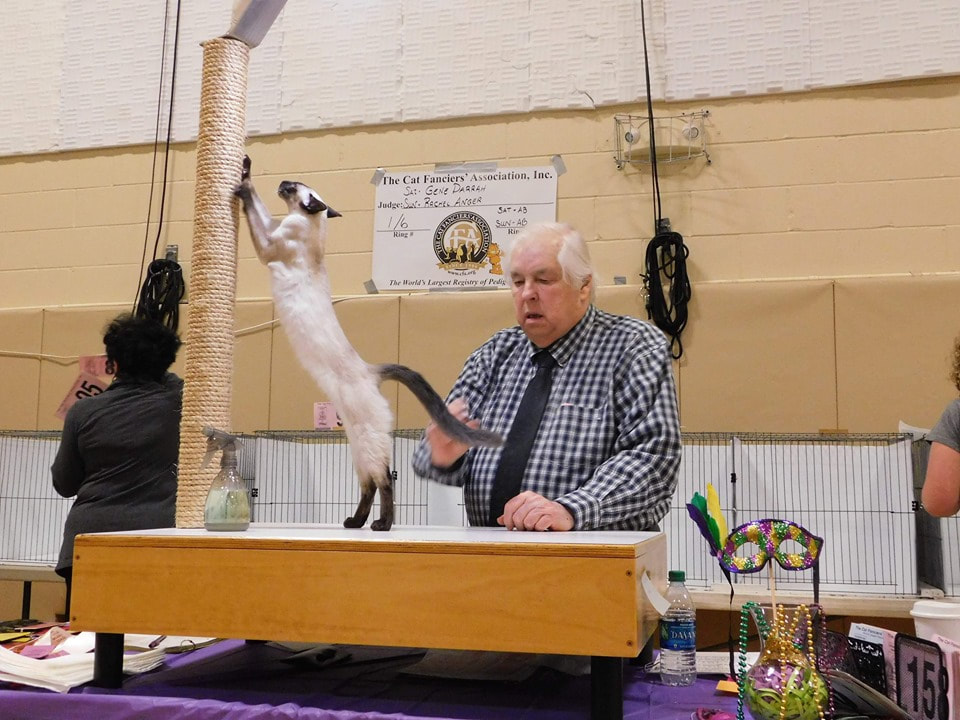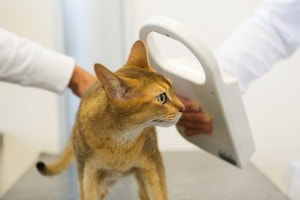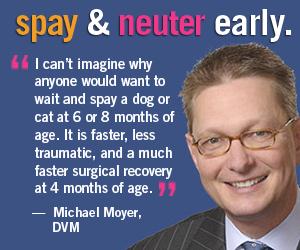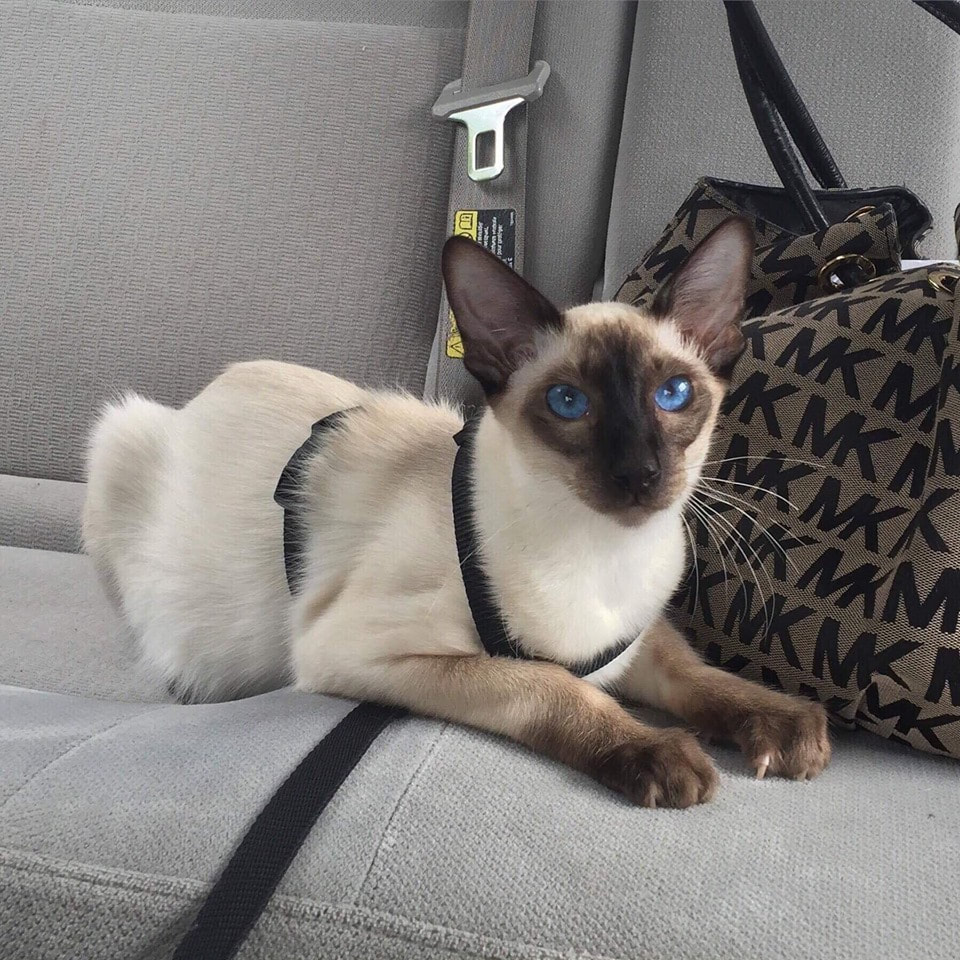HOW OUR BABIES ARE RAISED:
Our kittens are born in a "queening pen", which is generally a cat show shelter, a very small room (put together specifically for the cats), or a large enclosure. We use these so that our queens and their kittens have plenty of room, and they are kept confined. Otherwise, mama cats tend to move their kittens around, which can become a problem for various reasons. So we find it best to keep them all together where they can easily be accessed by us, and not our other cats. Babies stay in this pen until they are 4-6 weeks, (usually when they are starting to eat solid foods, and experiment with the litter box)
Our kittens are born in a "queening pen", which is generally a cat show shelter, a very small room (put together specifically for the cats), or a large enclosure. We use these so that our queens and their kittens have plenty of room, and they are kept confined. Otherwise, mama cats tend to move their kittens around, which can become a problem for various reasons. So we find it best to keep them all together where they can easily be accessed by us, and not our other cats. Babies stay in this pen until they are 4-6 weeks, (usually when they are starting to eat solid foods, and experiment with the litter box)
After the birthing pen, they graduate to the mesh play pen. This gives them a bit more room, but they can still be confined when needed. Once they are about 8-9 weeks old, and confident with the litter box, they are set out to explore the house for a few hours during the day. By 10 weeks, They are zipping through the house at full speed from one end to the other at 4am, and having a ball. They are following us around at our ankles during the day, and jumping in a lap whenever the opportunity is given. Our babies are riding around on our shoulders and cuddling up in our beds. The kittens in our home are raised with dogs. They grow up being followed around by an obnoxious little Pug, and a big cuddly Pitbull. They are used to loud noises in an active household, which tends to make the adjustment period In their new homes easier, as there are sure to be unfamiliar sounds, smells, and animals. As adults, our cats have free roam of the house.
HOW TO ADOPT FROM KOKIRI
We generally do not have kittens "readily available", as we work from a waiting list of pre-approved families/individuals for our kitten adoptions. However, we have kittens available from time to time that do not fit what the current families on our list are looking for, so feel free to reach out over the phone or by email to learn more. We do not take reservations for any particular litter or breeding, instead we take reservations for specific color or gender preferences (if you have any). To be considered as a potential adopter for one of our kittens, you should provide us with your phone number and the best day or time to arrange a phone interview, which consists of a short series of questions to make sure one of our kitties will be a good fit for your home, and that you and your family will be a good fit for one of our kitties. You may also send and email with information about yourself and what you're looking for in a kitty, or fill out a "contact form" here on our website, and provide some of that information.
PHONE: 716-706-9922
EMAIL: Kokiricattery@yahoo.com
We generally do not have kittens "readily available", as we work from a waiting list of pre-approved families/individuals for our kitten adoptions. However, we have kittens available from time to time that do not fit what the current families on our list are looking for, so feel free to reach out over the phone or by email to learn more. We do not take reservations for any particular litter or breeding, instead we take reservations for specific color or gender preferences (if you have any). To be considered as a potential adopter for one of our kittens, you should provide us with your phone number and the best day or time to arrange a phone interview, which consists of a short series of questions to make sure one of our kitties will be a good fit for your home, and that you and your family will be a good fit for one of our kitties. You may also send and email with information about yourself and what you're looking for in a kitty, or fill out a "contact form" here on our website, and provide some of that information.
PHONE: 716-706-9922
EMAIL: Kokiricattery@yahoo.com
DIET
All of our cats are fed a grain free diet of kibble (hard food), grain free canned food, chicken hearts, gizzards, and occasionally breasts/thighs. Cats of the Siamese/oriental breed group have been known to develop kidney issues later on in life if not fed a proper diet with lots of moisture, so we use canned food as the main meal for our cats. Dry food is left out for them to graze.
We have also noticed significantly less digestive issues compared to cats eating foods with grain included in their diets. Many Siamese/orientals have a sensitivity to grain, so we highly recommend they stay on a grain free diet with plenty of moisture.
http://www.onlynaturalpet.com/holistic-healthcare-library/food-diet---general/147/top-10-myths-about-pet-food-and-nutrition.aspx
http://www.bynaturepetfoods.com/top-3-benefits-of-grain-free-pet-food/
http://www.catster.com/cat-food/cat-food-wet-or-dry
DIET
All of our cats are fed a grain free diet of kibble (hard food), grain free canned food, chicken hearts, gizzards, and occasionally breasts/thighs. Cats of the Siamese/oriental breed group have been known to develop kidney issues later on in life if not fed a proper diet with lots of moisture, so we use canned food as the main meal for our cats. Dry food is left out for them to graze.
We have also noticed significantly less digestive issues compared to cats eating foods with grain included in their diets. Many Siamese/orientals have a sensitivity to grain, so we highly recommend they stay on a grain free diet with plenty of moisture.
http://www.onlynaturalpet.com/holistic-healthcare-library/food-diet---general/147/top-10-myths-about-pet-food-and-nutrition.aspx
http://www.bynaturepetfoods.com/top-3-benefits-of-grain-free-pet-food/
http://www.catster.com/cat-food/cat-food-wet-or-dry
PET INSURANCE
Each of our kittens leave us with 4 weeks of free pet insurance through Trupanion. Please go online and activate your kitten's insurance no longer than 24 hours after he or she arrives home. This insurance covers any emergency vet care, or unexpected sick visits. We recommend remaining on the plan so your baby will always be covered.
ABSOLUTELY NO DECLAWING!
We firmly believe that the choice to have a cat or kitten declawed is cruel and unnecessary. We do not offer kittens to owners who may have intentions on declawing. We try our best to inform and educate pet buyers about the barbaric procedure, and the health and behavioral issues it can lead to later on. Some cats have litter box issues because of it, and some have been diagnosed with arthritis in their paws. Per our contract, no kittens or cats adopted from Kokiri are to be declawed.
There are plenty of alternatives to declawing. We keep several cat trees and scratching posts in our home for the cats. Our babies are often used to these when they leave, and by purchasing a nice quality cat tree or scratching post you can usually avoid living with damaged furniture. Some of our pet buyers have used "claw caps", which can be applied at home, or with your vets help. This is another great alternative.
http://www.cfa.org/Portals/0/documents/articles/declawing.pdf
DO WE OFFER SHIPPING?
We have shipped with American Airlines cargo. We do not ship our babies until they are at least 16 weeks old, but we prefer to wait until 17 weeks. They are required to be up to date on vaccines, (rabies & distemper), and must have a valid health certificate issued by a licensed veterinarian no longer than 10 days prior to the set shipping date, when flying cargo. They are required to be kept in an airline approved crate throughout the flight. We also offer the use of a "flight nanny", who delivers kittens/cats from our airport to yours. When our kitties are traveling with the flight nanny, they stay in cabin, in a soft carrier, under the seats, and are not put in the cargo department of the plane. We have been asked questions such as "Aren't you worried a flight might traumatize the kitten?" The short answer is No. Our babies are raised in an active environment. They are used to all sort of noises. A flight to their new home is no more traumatizing than the first visit to the vet. We have received plenty of photos ad videos of our babies purring in their crates on the way to their new homes, from the airport.
https://www.aacargo.com/downloads/products/Live-Animals_flyer.pdf
We have shipped with American Airlines cargo. We do not ship our babies until they are at least 16 weeks old, but we prefer to wait until 17 weeks. They are required to be up to date on vaccines, (rabies & distemper), and must have a valid health certificate issued by a licensed veterinarian no longer than 10 days prior to the set shipping date, when flying cargo. They are required to be kept in an airline approved crate throughout the flight. We also offer the use of a "flight nanny", who delivers kittens/cats from our airport to yours. When our kitties are traveling with the flight nanny, they stay in cabin, in a soft carrier, under the seats, and are not put in the cargo department of the plane. We have been asked questions such as "Aren't you worried a flight might traumatize the kitten?" The short answer is No. Our babies are raised in an active environment. They are used to all sort of noises. A flight to their new home is no more traumatizing than the first visit to the vet. We have received plenty of photos ad videos of our babies purring in their crates on the way to their new homes, from the airport.
https://www.aacargo.com/downloads/products/Live-Animals_flyer.pdf
APPROPRIATE AGE FOR KITTENS TO LEAVE?
Kittens raised at Kokiri stay with us for a minimum of 15 weeks, however this time period can and will be extended if a baby needs more time with Mom. From what we've seen, this makes for a healthier kitten (both physically and emotionally). Kittens need their mother for more than just her milk, or the ability to feed them. The mother cat teaches her kittens manners, and instills confidence in her babies when it comes time for socializing. A properly socialized kitten is facing an easier/shorter adjustment period than one removed from it's mother and siblings too early.
http://www.breedlist.com/faq/young.htm
Kittens raised at Kokiri stay with us for a minimum of 15 weeks, however this time period can and will be extended if a baby needs more time with Mom. From what we've seen, this makes for a healthier kitten (both physically and emotionally). Kittens need their mother for more than just her milk, or the ability to feed them. The mother cat teaches her kittens manners, and instills confidence in her babies when it comes time for socializing. A properly socialized kitten is facing an easier/shorter adjustment period than one removed from it's mother and siblings too early.
http://www.breedlist.com/faq/young.htm
DO WE SHOW?
We show our breeding cats primarily with CFA. We feel it is important for any serious breeder to be sure they are producing cats that meet the breed standard. Showing is one of the best ways to do that. We work to promote and improve the cats in the Siamese/Oriental breed group. Feel free to reach out to find out which shows we might be attending if you'd like to meet some of our kitties, as we travel to some of the surrounding states occasionally for cats shows. Our cats are always happy to meet spectators. You can check for local cat shows on CFA and TICA's websites.
We show our breeding cats primarily with CFA. We feel it is important for any serious breeder to be sure they are producing cats that meet the breed standard. Showing is one of the best ways to do that. We work to promote and improve the cats in the Siamese/Oriental breed group. Feel free to reach out to find out which shows we might be attending if you'd like to meet some of our kitties, as we travel to some of the surrounding states occasionally for cats shows. Our cats are always happy to meet spectators. You can check for local cat shows on CFA and TICA's websites.
MICROCHIPPING
Each of our kittens leave our home with a microchip. This ensures that myself and the owner will be informed by a shelter, rescue, or veterinarian, should the kitten should be brought in and scanned for a microchip. This makes it easier to be reunited with their owner.
1 "It hurts your pet very little. Getting microchipped is as simple as getting a vaccination. It probably hurts about as much as it does when we get shots."
2 "It's a simple procedure. The microchip is about the size of a grain of rice and is inserted into a soft area on the back. Easy and simple."
3 "It could save your pet's life. If your pet is lost or stolen, having a microchip could be the key to bringing Fido back home. If "someone finds and takes your pet in to get scanned, you'll be reunited in no time."
4 It's your proof of ownership. If your pet is stolen and ends up getting scanned somewhere, your information will pop up, as long as you've registered the chip with the database. It's a quick way for your stolen pet to be returned to you."
http://www.cfa.org/Owners/CatCare/Microchipping.aspx
https://www.popsugar.com/pets/Why-You-Should-Microchip-Your-Pets-37312569
SPAY AND NEUTER POLICY
Here at Kokiri, we practice "ESN" (early spay and neuter), which means our babies are altered around 15-16 weeks of age. They come to you fully vetted. In our experience, we can see that kittens bounce back from the surgery much faster than our retired adults. In addition to the speedy recovery time, we have also noticed the temperaments of the kittens who have been altered very early on to be much sweeter, and sometimes more affectionate compared to the adults we've had spayed and neutered. You can read more about it in the link from the CFA website attached below.
http://www.cfa.org/Owners/CatCare/SpayNeuter/EarlySpayNeuter.aspx
Why we spay and neuter:
http://www.cfa.org/Owners/CatCare/SpayNeuter/SpayNeuterFAQs.aspx
Here at Kokiri, we practice "ESN" (early spay and neuter), which means our babies are altered around 15-16 weeks of age. They come to you fully vetted. In our experience, we can see that kittens bounce back from the surgery much faster than our retired adults. In addition to the speedy recovery time, we have also noticed the temperaments of the kittens who have been altered very early on to be much sweeter, and sometimes more affectionate compared to the adults we've had spayed and neutered. You can read more about it in the link from the CFA website attached below.
http://www.cfa.org/Owners/CatCare/SpayNeuter/EarlySpayNeuter.aspx
Why we spay and neuter:
http://www.cfa.org/Owners/CatCare/SpayNeuter/SpayNeuterFAQs.aspx
INDOOR HOMES ONLY!
We offer pet kittens to loving, indoor homes only. Most pet owners know and agree that allowing any pet cat to roam freely outdoors is unnecessary and just not safe. We want to make sure our kittens have the best chance at a long and happy life with their new families However, our babies and most of the Siamese/Balinese/oriental breed group are very adventurous, and enjoy taking part in whatever it is you're doing. They love being outside safely secured on a harness, or in a catio. We also take our babies for rides in the car, and trips to the pet store. .
http://www.cfa.org/Owners/CatCare/SaferIndoors.aspx
We offer pet kittens to loving, indoor homes only. Most pet owners know and agree that allowing any pet cat to roam freely outdoors is unnecessary and just not safe. We want to make sure our kittens have the best chance at a long and happy life with their new families However, our babies and most of the Siamese/Balinese/oriental breed group are very adventurous, and enjoy taking part in whatever it is you're doing. They love being outside safely secured on a harness, or in a catio. We also take our babies for rides in the car, and trips to the pet store. .
http://www.cfa.org/Owners/CatCare/SaferIndoors.aspx
COST OF A KITTEN?
You should expect to pay between $1000 and $2500 for any well bred pedigreed kitten from a reputable cattery.
https://www.cat-world.com.au/purebred-cats-expensive.html?fbclid=IwAR1ZhPUkYzw5cmVACKy9HRtY7AxUyjKxLN4tLNF-kZzLYO5_kHdf4lL0TJQ
You should expect to pay between $1000 and $2500 for any well bred pedigreed kitten from a reputable cattery.
https://www.cat-world.com.au/purebred-cats-expensive.html?fbclid=IwAR1ZhPUkYzw5cmVACKy9HRtY7AxUyjKxLN4tLNF-kZzLYO5_kHdf4lL0TJQ
